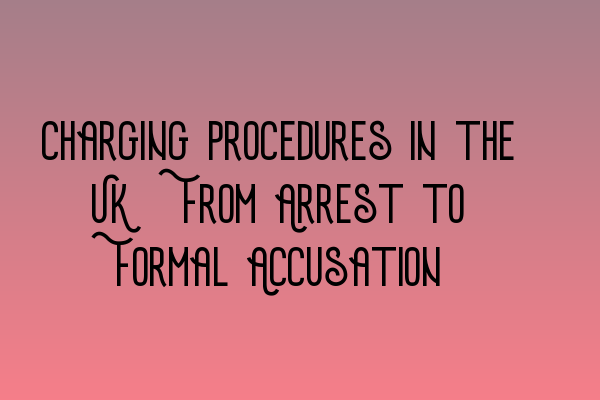Charging Procedures in the UK: From Arrest to Formal Accusation
When someone is suspected of committing a crime in the United Kingdom, the charging process is a crucial step in the criminal justice system. Understanding the various stages from arrest to formal accusation is essential for both legal professionals and individuals involved in criminal cases. In this blog post, we will provide an overview of the charging procedures in the UK, giving you a clear understanding of the process involved.
1. Arrest and Detention
The first step in the charging process is the arrest of a suspect. The police have the power to arrest an individual if they have reasonable grounds to believe that the person has committed an offense. Once arrested, the suspect can be held in police custody for a limited period, usually up to 24 hours, before being charged or released.
If the police require further time to investigate, they can apply for an extension to the detention period, known as a “detention warrant.” However, this extension is subject to certain legal restrictions to protect the rights of the arrested individual.
2. Investigation and Evidence Gathering
Following the arrest, the investigating authorities will gather evidence to determine whether there is enough grounds to charge the suspect. This process involves various investigative techniques, such as interviewing witnesses, collecting forensic evidence, and examining any available CCTV footage.
It is crucial for the defense and prosecution to thoroughly analyze the gathered evidence to establish a strong case. Understanding the rules of evidence is vital for both sides, as it can greatly impact the outcome of the charging process.
3. Charging Decision
After the investigation is complete, the prosecution will review the evidence and decide whether to charge the suspect. They will consider several factors, including the strength of the evidence, public interest, and the seriousness of the alleged offense.
If the prosecution determines that there is sufficient evidence, they will issue a charge against the suspect. The specific charge will depend on the nature of the offense, ranging from minor offenses to more serious crimes.
4. Charging Procedure
Once the suspect is officially charged, the case will proceed to the court system. The court will schedule an initial hearing called the “first appearance,” where the accused will be formally informed about the charges against them.
The first appearance is a crucial stage in the charging process, as it sets the foundation for the subsequent proceedings. The accused will have the opportunity to enter a plea, whether guilty or not guilty, and to seek legal representation if they haven’t already done so.
5. Legal Assistance and Representation
Having competent legal assistance in the charging process is essential to ensure a fair trial. If you are accused of a criminal offense, it is advisable to seek the services of an experienced criminal defense solicitor.
A solicitor will guide you through the legal proceedings, help you understand your rights, and provide expert advice based on their knowledge of the criminal justice system. They will analyze the evidence presented against you and develop a robust defense strategy to protect your interests.
If you need further guidance or wish to expand your expertise in criminal practice, consider attending our Workshops and Seminars on Criminal Practice: Expanding Your Expertise. These events provide comprehensive insights into the latest developments and strategies in criminal law.
Conclusion
Understanding the charging procedures in the UK is crucial for legal professionals and individuals involved in criminal cases. From the initial arrest and detention to the final formal accusation, each step in the process plays a significant role in determining the outcome of a criminal case.
Stay informed about updates in UK criminal laws by regularly visiting our website and reading our Updates in UK Criminal Laws: Staying Informed and Prepared blog post. Enhance your SQE criminal law study group experience and delve deeper into various legal topics through our informative SQE Criminal Law Study Group.
For a more detailed analysis on the rules of evidence, we recommend reading our article on Decoding Criminal Evidence Rules: A Detailed Analysis. Additionally, learn about the legal protections and support available for victims of crime in our post on Ensuring Rights of Victims in Criminal Procedures: Legal Protections and Support.
